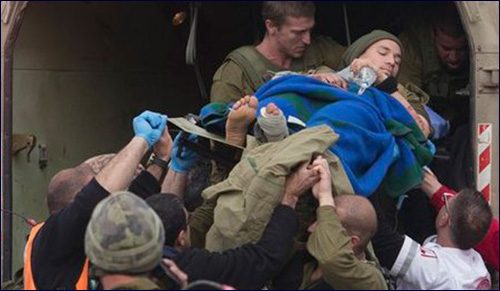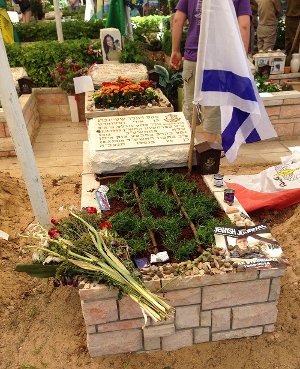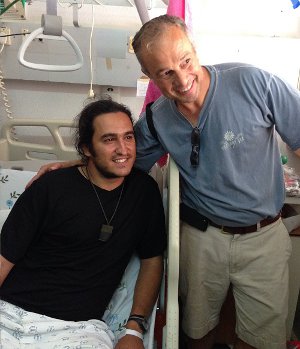 Iran’s Attack on Israel
Iran’s Attack on Israel


4 min read
3 min read
7 min read
7 min read
Our Israel Solidarity mission visits the wounded and attends heartbreaking funerals.
We stand by the new graves of the fallen soldiers. So new they are just mounds of dirt covered with stones and notes. I stare down at the tiny scraps of paper: "We love you. We miss you. You will always be a hero in our hearts." Some of the graves have photos of the soldiers on them. They are all so very young, and they are all smiling, as if their lives are just beginning.
One of the notes has ten scribbled words in Hebrew that bring deep comfort within the grief: “The eternal nation is not afraid of the long road.”
I look at those words for a long time. I think about them as a father of a fallen soldier stands beside us and cries openly into the bright, cloudless summer sky. And I think of those words as we gather around the grave of Max Steinberg, the lone soldier who died just weeks before in Gaza. The leader of our Young Israel of Scarsdale Solidarity Mission, Rabbi Jonathan Morgenstern, stands before Max's grave and speaks about how this is a grave that won't have many family members visiting because Max's family lives in California. How he was an American, just like us, who was willing to die for what he believed in.
A dozen birthright groups at the cemetery begin to slowly gather around us. Rabbi Morgenstern starts to recite Kel Rachamim. O God, full of mercy, Who dwells on high, shelter him in the shelter of His wings for eternity. The tears begin to trickle down our faces as a gentle breeze weaves its way through the trees that cradle newborn graves. Beside me, a teenage boy from one of the birthright groups is quickly wiping away his tears and gazing out at the distant mountains below us. We are all here to say thank you to these soldiers. And to their families. We are here to honor what they stood for. From all over the world we stand around these too new graves and pray. The eternal nation is not afraid of the long road.
 Later we stand beside the hospital bedside of a tank commander who lost four of his soldiers that morning in battle. He is in terrible pain, his leg shattered and set in a metal contraption. But he sits up when he sees us, wincing in pain. "Please, please pray for my boys who were killed. They were such good boys. Pray for their souls. Please, Rabbi, I want you to pray for my boys. When you go back to America tell everyone how brave my boys were. How they fought until their last breath for you. For all of you. Tell them to pray." Exhausted, he lays back down and holds onto the hospital bed trying to contain his pain. "Make sure they pray. They were such good boys."
Later we stand beside the hospital bedside of a tank commander who lost four of his soldiers that morning in battle. He is in terrible pain, his leg shattered and set in a metal contraption. But he sits up when he sees us, wincing in pain. "Please, please pray for my boys who were killed. They were such good boys. Pray for their souls. Please, Rabbi, I want you to pray for my boys. When you go back to America tell everyone how brave my boys were. How they fought until their last breath for you. For all of you. Tell them to pray." Exhausted, he lays back down and holds onto the hospital bed trying to contain his pain. "Make sure they pray. They were such good boys."
We visit more injured soldiers. We bring them small books of Psalms that we have brought with us. We tell them how we pray every day for their safety, how we are thinking about them, how all over the world, Jews are praying for their recovery. Their eyes light up. They thank us and tell us to ask more people in America to come to visit. "Tell them how much we need them. Tell them how much strength it gives us when you come."
Later, in the conference room of the Barzilai Hospital in Ashkelon, the head of the emergency room explains how they have to evacuate 70% of their patients in a rocket attack, and bring the remaining 30% that cannot be sent home into shelters. He shows us films of the NICU bassinets being transported to a tiny concrete building on the hospital grounds. I cannot imagine how they do this. The amount of machinery and tubes that must be meticulously transported, the intricate level of organization it takes to evacuate so many patients. He shows us a slide of a rocket that landed a few feet from the emergency room and miraculously didn't explode. He shows us where his own house is, 300 meters from the Gaza border. And he shows us slides of Arabs from Gaza that the hospital treats on an ongoing basis.
One of the slides shows a pregnant woman who had frantically called Israel for help; Hamas was shooting rockets from her backyard, she was going through a high risk pregnancy and she wanted to come to Barzilai hospital. Israel immediately sent an ambulance into an extremely dangerous area to bring her to Ashkelon where she had a healthy baby girl. In the back of the conference room is a model of what a medical personnel may need to wear while dealing with high alerts and chronic mass traumas. The eternal nation is not afraid of the long road.
"Thank you. You give us strength. When you go back to America, tell them to come."
Later we visit the ICU at Soroka hospital in Beersheva; only one soldier can respond to us there. He had been shot in the throat, but the bullet missed an artery by a millimeter. The soldier was operated on in the field, and had a tracheotomy put in until he can breathe again on his own. So he cannot yet speak but he is fully conscious, looking at us with warm eyes and a miraculous smile. His father has tears in his eyes when he sees our group: "Thank you. You give us strength. When you go back to America, tell more people. Tell them what you see. Tell them to come."
The other soldiers we see that day in the ICU are heartbreaking sights; head injuries that rendered once handsome young men into unrecognizable, swollen patients, hearts that had stopped beating and had to be surgically re-started, shrapnel stuck inside ears, foreheads, necks. The ICU doctor tells us the shrapnel could never be removed; it is too risky. He explains that the category of "lightly" wounded isn't what we would think of as lightly wounded. It can mean losing an eye, an arm, a leg. You can only imagine then what moderate and seriously wounded means.
 A soldier visiting one of his injured friends tells us, "Four of my friends died yesterday. I'm going this afternoon to another funeral."
A soldier visiting one of his injured friends tells us, "Four of my friends died yesterday. I'm going this afternoon to another funeral."
And we go to that funeral at Har Herzl after visiting the hospital. The funeral of Liel Gidoni. There are hundreds of Jews there from every segment of the population. Secular, religious, Israeli, foreigners; all crowded together near the other freshly dug graves that we had just recently prayed beside. Liel's brother screams into the fading afternoon light. "Please come back, Liel and help me do this! I cannot say good bye. I don't know how to go on without you. Liel, you have gone to a better place. A place where there are no enemies pursuing you. No explosions. No fighting. But who will I turn to now when I need my brother, my friend? Who will I turn to when I need you? Liel, I can't believe I am standing here, this cannot be real. But you were the one who always smiled and said everything will be okay. That's what I need now. Liel, your smile and your strength, your hope. Liel, give us back your hope!"
And then the prayer begins for a fallen soldier: "This is a hero who died Al kiddush Hashem, sanctifying God’s Name. May his holy soul rest in Gan Eden…" There is such an intense, unspeakable sense of unity surrounding the Gidoni family. The eternal nation is not afraid of the long road.
There is hope within grief, prayer within doubt, and life within death. We have seen it. We have felt it. The hope emanating from the hospital corridors and from the top of Har Herzl. We came to comfort and instead, we ourselves were comforted. “Nachumu, nachumu ami – be comforted, be comforted My people” we read from Isaiah the Shabbat after Tisha B’Av. May God gather the eternal nation into His arms and show us the way on the long road ahead of us.
